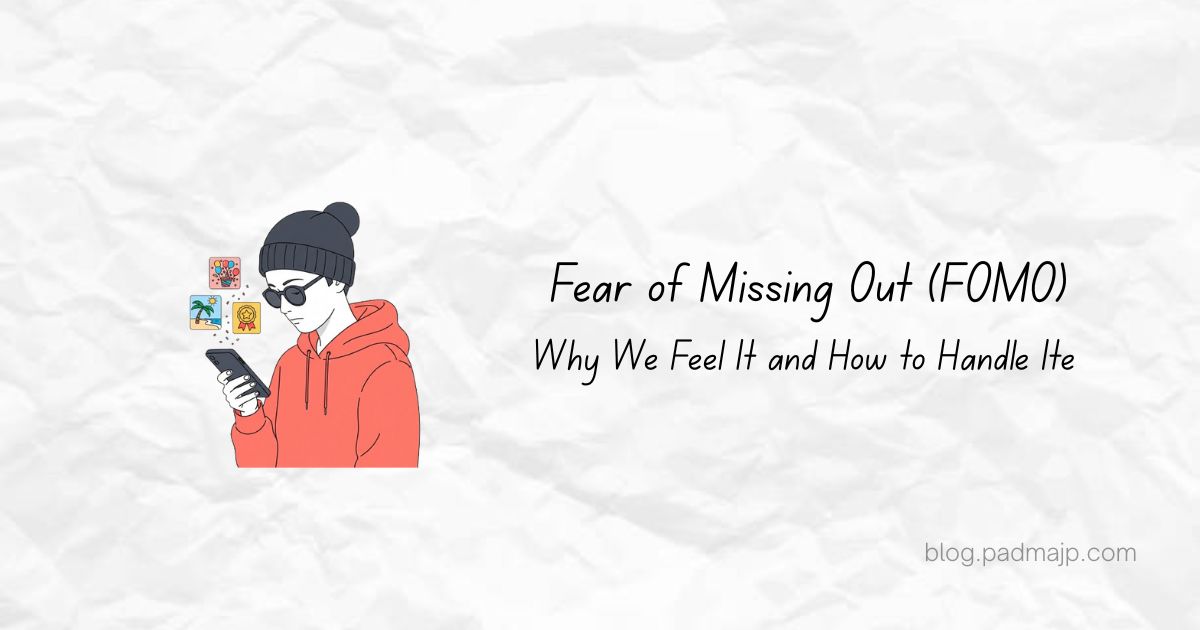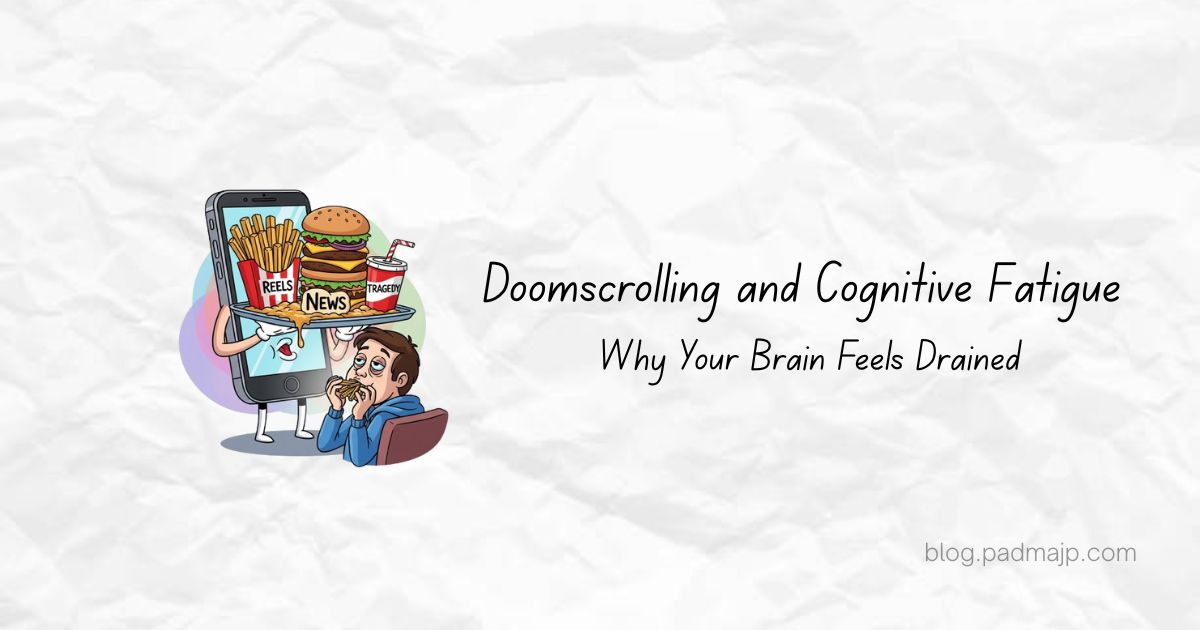I’ll be honest — there have been times when I’ve been scrolling through Instagram late at night, and suddenly, a reel pops up: friends on a beach vacation, influencers at some fancy rooftop bar, or someone announcing their latest “life update.” And there I am, lying on my bed, wondering: Am I missing out on life?
That uneasy little voice in your head — that’s FOMO, the Fear of Missing Out. It’s more than just a catchy phrase; it’s a very real feeling that can creep up on anyone. And in today’s world of nonstop social media feeds, it feels almost impossible to escape.
Why Do We Feel FOMO?
At the root of it, FOMO isn’t new. Humans have always had a need to belong. Thousands of years ago, being part of the group wasn’t just nice, it was survival. If you got left behind, it meant danger. Fast forward to now, and we’re still wired the same way.
Only today, the “tribe” we’re worried about missing out on is often online. Social media throws us into constant comparison mode. Every scroll, every story, every reel is like a little reminder: someone else is doing something fun while you’re not.
The truth? These are curated snapshots the highlights, not the whole movie. Nobody uploads a reel of themselves struggling with self-doubt. I know I don’t. I’m not about to post a photo of myself after crying through a rough day but those moments are just as real as the happy ones.
How FOMO Shows Up in Real Life
FOMO wears a lot of disguises. Here are a few I’ve noticed — maybe you’ll relate:
- The Social Media Scrol - This is the classic one. You see influencers traveling, eating at cool restaurants, or living picture perfect lives. And instantly, that thought hits: Their life looks amazing. What am I even doing with mine I’ve caught myself thinking this more times than I’d like to admit. But then I remind myself: it’s a highlight reel. Even the happiest looking influencer has bad days, they just don’t post them.

Work & Career FOMO - LinkedIn is full of it. A friend gets promoted, someone else announces their new side hustle, another person posts a shiny certificate. Suddenly, your own progress feels small, even if you’re actually doing fine.
Shopping & Deals - Ever seen a site flash “Only 1 left!” or “Offer ends tonight”? That’s FOMO in marketing form. And yes, I’ve fallen for it. Sometimes I bought things I didn’t even need, just because I didn’t want to “miss out.”
Social Plans - Saying “yes” to every party, trip, or hangout just so you’re not the one left out of group photos. It feels fun in the moment, but if you’re running on empty, it eventually catches up with you.

Inspired by FOMO, several other related concepts have also emerged. Some of these are highly related to the experience of FOMO, while others take a slightly different approach:
- FOBO (Fear of Better Options): This refers to fearing that you are missing out on potentially better alternatives.
- MOMO (Mystery of Missing Out): This refers to fearing that you are missing out but not having any clues about what you’re missing out on.
- ROMO: (Reality of Missing Out): This refers to knowing that you aren’t missing out on anything.
- FOJI (Fear of Joining In): The fear of sharing things on social media but not garnering any response.
- JOMO (Joy of Missing Out): This is the opposite of FOMO and refers to positive feelings about missing out or disconnecting from social media.
The Real Cost of FOMO
At first glance, FOMO feels like just a little itch. But if you’ve felt it often, you know it does more than just bother you.
It pulls you away from the present moment. You’re so busy worrying about what you’re missing that you can’t enjoy what’s right in front of you.
It drains your energy and money — buying things, joining every plan, or stretching yourself thin just to keep up.
It chips away at your mental health, leading to stress, anxiety, or even feeling “less than.”
For me, the worst part of FOMO is that it never ends. The second you “catch up,” there’s always something new happening that you’re not part of. It’s like running a race with no finish line.

How I’ve Learned to Deal With FOMO
Now, I’m not going to pretend I’ve got it all figured out. FOMO still shows up for me. But over time, I’ve picked up a few ways to keep it from taking over:
Flip it into JOMO (Joy of Missing Out)
Instead of stressing about what I’m not doing, I try to enjoy what I am doing. A quiet evening with a book, or coffee with a close friend, can be just as fulfilling as a flashy night out. Sometimes saying “no” is actually saying “yes” to peace.
Limit the Scroll
I’ve noticed that the more time I spend scrolling, the worse I feel. Setting little boundaries (like no Instagram right before bed) helps more than I expected. Out of sight, out of mind actually works.
Gratitude Check
When FOMO hits, I pause and remind myself of the good in my own life. It might sound a little cheesy, but even small things like a supportive friend, a project I’m proud of,or just a calm moment with a cup of coffee near a beach. Actually, that’s one of the main reasons I started journaling and writing these blogs to remind myself of the good things I’d usually scroll past in my own life.
Choose What Truly Matters
Instead of chasing everything, I ask: Does this align with what I actually want? Half the time, the answer is no. That realization saves me from a lot of unnecessary stress.
Invest in Real Connections
Face-to-face time with people I care about always feels better than racking up “likes.” It’s grounding in a way that scrolling never is.
Closing Thoughts
FOMO is part of being human. We all feel it. And in a world where social media is constantly showing us a filtered version of reality, it’s no wonder it hits us hard.
But here’s what I’ve learned: missing out isn’t always a bad thing. In fact, sometimes it’s a blessing. The more I focus on being present and enjoying the life I do have, the less I worry about the one I think I’m missing.
So next time you catch yourself staring at an influencer’s reel thinking “they’re living life and I’m not” pause for a second. Remember: what you’re seeing is just a glimpse, not the whole picture. Your story with its highs, lows, quiet moments, and real connections is just as valuable.
Maybe missing out isn’t really missing out at all



Comments